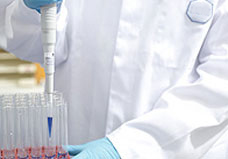| |
 |
|
|
|
|
|
|
Serum creatinine |
|
|
Overview & Description
Creatinine is a waste product made by the body during regular
metabolism. It is excreted into the urine by the kidneys. A serum
creatinine test measures the level of creatinine in the blood.
The level of creatinine in the blood is a good measure of overall
kidney function. When the kidneys are not working well for any
reason, they are not able to excrete creatinine into the urine.
When this happens, the level of creatinine in the blood rises.
Who is a candidate for the test?
Doctors may order this test when they think a person is dehydrated
or has kidney damage. This test may also be ordered before or
after a doctor prescribes certain medicines. The main reason to
order the test is to make sure the kidneys are working well.
How is the test performed?
To perform a serum creatinine test, a blood sample is taken from a
vein on the forearm or hand. First, the skin over the vein is
cleaned with an antiseptic. Next, a strong rubber tube called a
tourniquet is wrapped around the upper arm. This enlarges the
veins in the lower arm by restricting blood flow through them.
A needle is gently inserted into a vein, and the tourniquet is
removed. Blood flows from the vein through the needle, and is
collected in a syringe or vial. After the needle is withdrawn, the
puncture site is covered with a bandage for a short time to
prevent bleeding. The blood sample is sent to the laboratory to
determine the amount of creatinine circulating in the blood.
Results and Values
What do the test results mean?
The normal level of creatinine varies slightly based on age, body
size, and sex. The level also changes during pregnancy. However,
the healthy range is usually between 0.5 and 1.4 milligrams per
deciliter (mg/dL).
A decreased value for this test is rarely a concern. It can occur
with decreased muscle mass, such as in elderly people. Conditions
such as muscular dystrophy, which is an inherited defect in
muscles, can cause a low value for this test. Pregnancy may also
cause a low value.
A high value for this test can occur for many reasons. Some of
these reasons are described in the sections that follow.
Decreased blood flow to the kidneys
The blood flow to the kidneys can be decreased by the following
conditions or events.
- severe dehydration
- massive blood loss
- congestive heart failure
- blockage in the kidney arteries, called renal
artery stenosis
|
|
|
|
Serum creatinine - treatment of Serum
creatinine, Serum creatinine types, Disease medicines, Serum creatinine
symptoms, Serum creatinine and Disease symptoms, Serum creatinine symptoms
Disease and diagnosis, Symptoms and Solutions, Signs and Symptoms, type of
Serum creatinine, cause common, common Serum creatinine, Serum creatinine
List, causes list, Infectious Serum creatinine, Causes, Diseases , Types,
Prevention, Treatment and Facts, Serum creatinine information, Serum
creatinine: Definition, Serum creatinine names, medical Serum creatinine,
medical Serum creatinine and disorders, cell Serum creatinine, Serum
creatinine Worldwide, Serum creatinine Research, Serum creatinine Control,
Serum creatinine Center, Digestive Serum creatinine Week, Information about
Serum creatinine, causes of different Serum creatinine, Serum creatinine
Articles, Serum creatinine and conditions, Health and Serum creatinine,
Serum creatinine Patients, Serum creatinine and Sciences, causes of
alzheimer's Serum creatinine, Serum creatinine causes, alternative medicine
heart Serum creatinine, body ailments, Serum creatinine medicines, medical
antiques, type of blood Serum creatinine |
|
|





